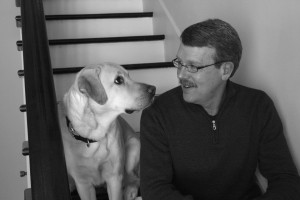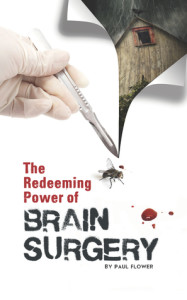Paul Flower is an author, advertising copywriter/creative director and a journalist.
He has written and produced award-winning advertising for print, radio, television, outdoor, the Web––really, just about every medium––for business-to-consumer and business-to-business accounts.
His news features have appeared in regional and national magazines. His first novel, “The Redeeming Power of Brain Surgery,” was published in June 2013 by Scribe Publishing.
Visit Paul’s website at paulflower.net.
Connect with Paul:
Author Website: paulflower.net
Author Page / Publisher Website: http://scribe-publishing.com/brain/
Twitter: https://twitter.com/flowerpaul
About The Book
Title: The Redeeming Power of Brain Surgery: A Suspense Novel
Author: Paul Flower
Publisher: Scribe Publishing Company
Publication Date: June 1, 2013
Pages: 250
ISBN: 978-0985956271
Genre: Susepense
Format: Paperback, eBook (.mobi / Kindle), PDF
Book Description:
Jesse Tieter, M.D. has carefully constructed the ideal life. But lately, neither his Chicago-based neurology practice nor his wife and son are enough to suppress the memories that have haunted him since he was a little boy. He can't stop thinking about that summer day in 1967 when his father died.
So Jesse is heading back. Back to the town and the place where a long-repressed horror occurred. Back to make sure his twin keeps the family's secret buried.
But what will he uncover along the way?
Book Excerpt:
His son’s hand felt like a lie. Lately, to him,
everything felt this way. The look of sadness on his wife’s face, the burn of a
drink in his throat, the whine of a saw in the O.R.; nothing seemed true. Nothing
was real anymore. He felt out of balance, too. Even now, the school building,
the flag slapping against the heavy fall sky¬¬—everything was tipping away from
him. It was as though he’d gotten up that morning and screwed on his head
carelessly, as though he hadn’t threaded it good and tight. While shaving, he’d
cut himself, a discrete, semi-intentional knick just under the curve of his
chin. He’d stood there like an idiot, eyes feeding the message “blood” to his
brain, nerve endings responding with “pain” and the logic center unable to
formulate a response.
“Dad? Daddy?”
“Uh? Wha’?”
“Pick up the pace. Chop chop. Move out.”
Now, as he snaked through the crush of other
parents and children, he had to look down to convince himself the boy was
there, attached to the hand, flesh and bone. The red hair, “his mother’s hair”
everyone called it, was sliced by a crisp white part; his head bounced in beat
with his sneakered feet. The child was so painfully real he couldn’t be a lie.
It amazed him that his son looked so much like his
wife, especially the tiny mouth, the way it was set in a crooked, determined
line. He was a kid who liked to have fun, but he could be fierce. Today, the
challenge of a new school year, of third grade, had brought out the determined
streak. This was good. They would need that streak, he and his mother would.
“Whoa.” The
tiny hand now was a road sign, white-pink flesh facing him, commanding him. Far
enough. He obeyed. Squatting, arms out for the anticipated embrace, he suddenly
wanted to tell everything. Tears swam. His throat thickened. The earth tilted
and threatened to send him skittering over its edge. There was the slightest of
hugs, the brush of lips on his cheek then the boy was off, skipping toward the
steps as though third grade challenged nothing, caused no fear, as though the
world was in perfect balance.
He walked back to his Lincoln Navigator with the
exaggerated care of a drunk who didn’t want anyone to know his condition. He
got behind the wheel and suddenly was no longer in his 50s; he felt 16 and too
small, too skinny and insignificant to handle the giant SUV.
He nosed the vehicle toward home, alternately
trembling and gripping the wheel as he merged with the morning traffic. The
plan struck him now as odd and silly, the challenges too great. His hands,
already red and scaly, itched fiercely. Get a grip, he told himself. Get a
grip.
His tired mind—when was the last time he’d really
slept well?—jumped from one stone of thought to another. Was everything covered
at work? The bills—had he paid them all? Did his wife suspect anything? Yes.
No. Absolutely. Of course not. Relax. Relax. He left the expressway at the exit
that took him past their church and wondered if the church, too, was a lie.
What of the wedding there so many years ago?
Through a stoplight and past a Dunkin’ Donuts, his
gaze floated around a corner. A flash of inspiration—hit the gas. Let the tires
slide and the back-end arc around. Let physics have its way until the big
vehicle broke free from the grip of gravity and danced head over end, coming to
a stop with him bleeding and mercifully, gratefully dead inside.
No. He had something to do. Had he figured the
angles right? Gotten the plan tight enough?
A horn jabbed through his reverie. He had drifted
into the turn lane of the five-lane street. He jerked the wheel and cut across
traffic into the right lane. Tires screeched, horns screamed. A black Toyota
streaked past on his left, the driver’s fist, middle finger erect, thrust out
the window.
Rage, sharp and bitter, bubbled in his throat. He
hesitated, then jammed his foot on the accelerator, cut the wheel hard, and
sent the Navigator careening into the left lane.
A staccato barrage of profanity pounded the inside
of his skull. He bit his tongue to keep the words in. His heart hammered and a
familiar, dizzying pressure filled his ears. The SUV roared ahead, past one
car, past a semi then another car, quickly closing the gap on the speeding
Toyota. He couldn’t see the car’s driver but he could imagine him, some stupid,
simple-minded schmuck, eyes locked on the rear-view mirror as the lumbering
Lincoln grew larger, larger, larger. The instant before he would slam into the
smaller vehicle, he jabbed his brake and turned again to the left. There was a squeal
of tires and more horns bleating behind him; the semi rig’s air horn bellowed
angrily past. Ramrod straight, eyes fixed ahead on the now-slow-moving car
disappearing tentatively around a curve, he brought the Navigator to a
shuddering stop in the center lane. He tensed and waited for the resounding
WHUMP of a crash from behind. None came. Face flushed and eyes gleaming,
suddenly rejuvenated, he accelerated quickly then eased the Navigator back into
the flow of traffic—no looking back.
Buy The Book:
Barnes & Noble: http://www.barnesandnoble.com/w/the-redeeming-power-of-brain-surgery-paul-flower/1115659168?ean=9780985956271
Discuss this book in our PUYB Virtual Book Club at Goodreads by clicking HERE
Author Interview
The Redeeming Power of Brain Surgery is the story of twin brothers and the horrible childhood secret they share. One brother is now a successful Chicago neurosurgeon. The other is a simple-minded blue-collar worker who has spent his life in their southwest Michigan hometown. When the brain surgeon returns home to ensure the family secret stays buried, a revealing story of suspense, dysfunction and a bit of redemption results.
Why did you write your book?
The somewhat snarky answer would be “because I’m a writer.” In large part, that’s why I wrote it. I have written professionally for more than 30 years (primarily in advertising) and have always dreamed of being a novelist. I wrote the first draft of this novel back in the 1980s. It began as an exercise in writing full-length fiction and ended up becoming an exploration of man’s dual nature, of good and evil, of family dysfunction, and of the secrets we carry.
Can you tell us a little about your main and supporting characters?
Yes. Jesse Tieter is a successful Chicago neurosurgeon. Jesse lives in suburban Evansville with his wife and young son. Beneath the veneer of a successful life, he is a tormented and disturbed 50-something damaged by a very troubled childhood. His twin is Elvis Icabone, a simple, good-hearted blue-collar worker who also feels the long-hidden horrors of his family’s past tugging at him. Elvis lives in their small southwest Michigan hometown with his wife, Lavern. Lavern is a sweet but tough small town girl who loves Elvis deeply, regrets not being able to have children, dreams of a better life, and has long worried over her husband’s past. Elvis and Lavern have a lifelong buddy, Donnel, who is a big-hearted, lovable man. Donnel would do anything to help his friends. The twin’s mother is an ill, mean shrew who still torments her son Jesse from a Traverse City nursing home. The character that ultimately gets to the bottom of the mess-of-a-family story is Harvey Monahan, a former Chicago cop with a past of his own.
Do you tend to base your characters on real people or are they totally from your imagination?
As my mother used to tell me, “it takes all kinds to make a world.” She was right. The people around us are stranger than any fiction. So my fictional characters are, yes, taken from the world in which I live. But they’re also thrown in the blender with my somewhat twisted imagination.
Are you consciously aware of the plot before you begin a novel or do you discover it as you write?
Great question. I don’t outline. I don’t plan very far ahead. I let the story talk to me through the characters. I know that sounds like cosmic writer talk. But it’s true.
Does the setting play a major part in the development of your story?
Yes. I think it has to play a major role. Every one of us is a product of his or her environment. Our personal stories are hopelessly entwined with the places in which we live. Jesse Tieter MD, and his twin, Elvis Icabone, are products of rural, small town, middle America. Yet Jesse is also shaped by Chicago. All of that plays a major role in who they are, who they become, and how they react to the circumstances I throw at them.
Have you suffered from writer’s block and what do you do to get back on track?
Yes. For me, writer’s block means I just hate everything I write. I try to come up with a sentence that works, and I simply can’t find one. I try to push through it. But if it goes on for long, I take a break, read something else, go for a run––do something different. The problem can take an hour to fix or it can go on for days. Ugh.
What do you like the most about being an author?
I love the written word or, more appropriately, written words. When they fit together in a beautiful way––being able to create something that moves me, elicits an emotional response; there’s nothing like it. Knowing that someone else will react to it, that’s even better. It’s wonderful.
What is the most pivotal point of a writer’s life?
The first time you discover the magic of a well-turned phrase, when you feel the rhythm and cadence of your own work and know that’s your thing––your creation.
What kind of advice would you give other fiction authors?
This is cliché, but true: an author is a writer who never gave up. It took the better part of 30 years to publish my first novel. In the end, what kept me going was that the book mattered to me. I believed in it. Ultimately, I wrote it to please me. Also, I never stopped trying to improve it, refine it, polish it. You can’t get to the Promised Land by taking shortcuts. And you can’t get better if you don’t listen to critics. So listen. Rewrite. Rewrite. Rewrite. And believe.



